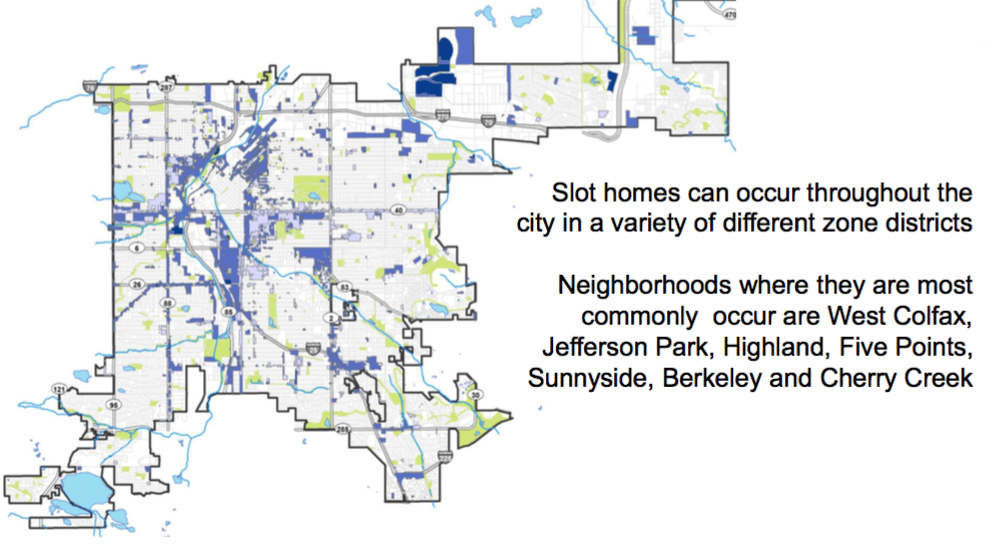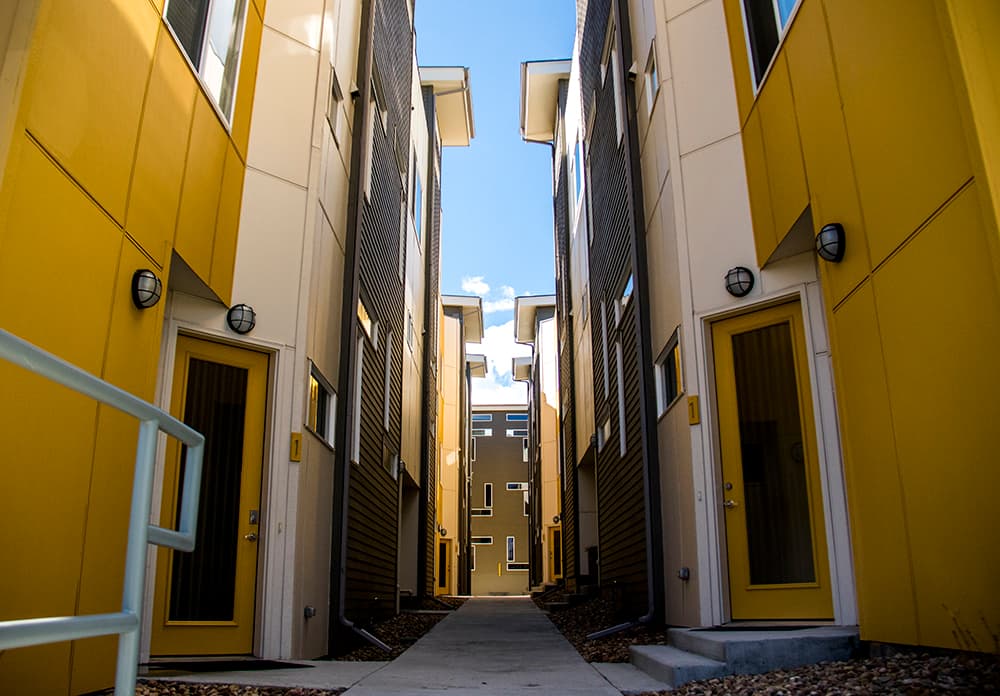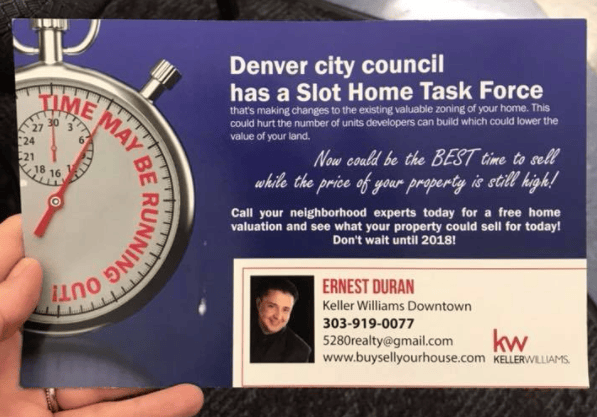
An ominous message arrived recently in hundreds of mailboxes around central Denver. "Time may be running out!" the flyers declare, complete with an image of a stopwatch.
The flyers, sent by a local real-estate broker, are the latest twist in the story of Denver's "slot homes," an unusual style of housing that has proliferated here in recent years.
The city government is preparing an attempt to ban the widely criticized design. Meanwhile, some developers and real-estate players are warning that the change could affect parts of the real-estate market. The flyers, which quickly became controversial, declared that it could "lower the value of your land," urging owners not to wait to sell.
"There were people that were attacking me on this, saying that this was a fear tactic," said Ernest Duran, an associate real-estate broker with Keller Williams Downtown, who sent the flyers.
"It’s not a fear tactic. It’s very true. It’s very real that this could impact values. People have a right to know."
Councilman Wayne New, however, said that real-estate interests are employing "scare tactics" to get land and maximize profits before the new rules take effect.
"It’s a bunch of hooey. They’re making a ton of money. And it doesn’t fit the neighborhood character. You need to build quality housing, not this rundown motel-looking stuff," he said.
And Councilman Rafael Espinoza said that developers still could pursue high-density projects in place of slot homes. Developers in those multi-unit zones can still pursue taller apartment projects that could prove even more lucrative, he said.
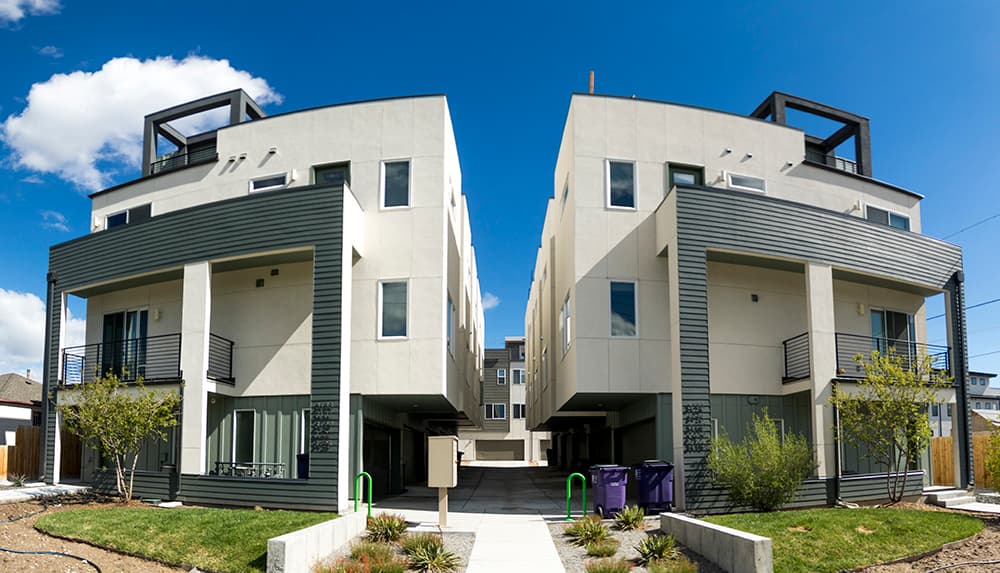
Quick refresher:
First, if you're not familiar, "slot home" is a derisive name for many of the condos and town homes that have materialized around Jefferson Park and other central Denver neighborhoods in recent years. They look like they're sideways -- mostly barren walls toward the sidewalk, garages and doorways facing inward along shady canyons.
The city has been working for more than a year on a proposal to change the zoning rules and ban them.
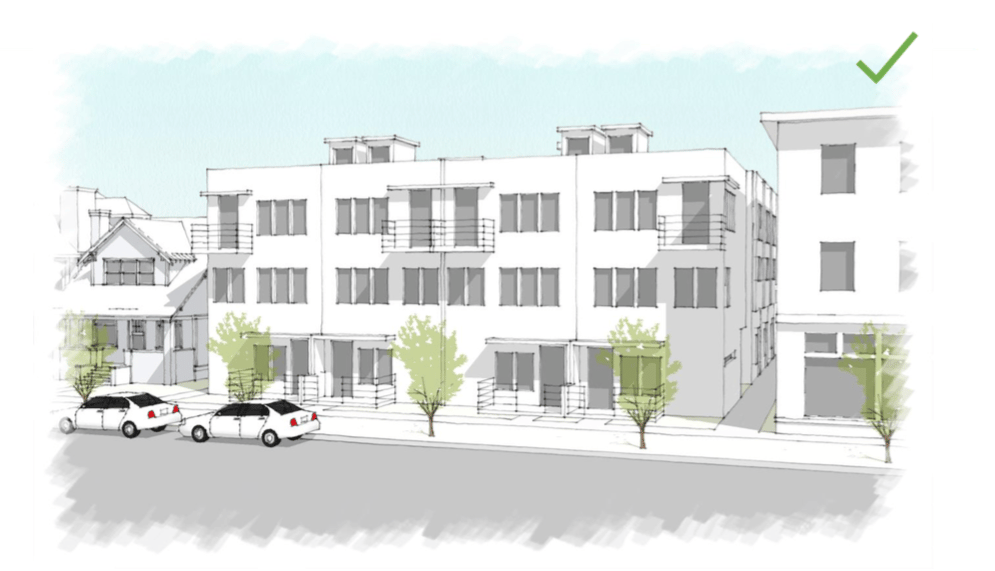
Here's why some real-estate people say they're worried.
Slot homes do not exist because they're beautiful. They exist because of the free market. Developers want to sell as many units as possible, and the slot home is an optimal configuration of walls to maximize square footage.
The proposed change eliminates that strategy. It says that urban townhouses and condos must face toward the street. The buildings also would have to stand further back from the sidewalk in many cases.
That may fix the design problem, but it also would allow one fewer housing unit in these town home and condo projects, according to estimates from developers and city staff.
"It will create a better product, but I do think that real-estate wise, there's going to be a couple hundred land sellers that are going to be very unhappy with this," said Ty Mumford, a developer who also is on the city committee that developed the new slot home rules.
"They think that their house that they’ve been renting out for a decade is going to be worth $500,000, and it’s going to be worth $390,000 come June."
He said that his company has run models under the new rules. The effects could be more severe on larger lots, potentially reducing a 12-unit complex down to nine units, he said. Lots on corners could shrink from five units to two, he said. He also anticipates that townhome units will be smaller.
Mumford estimates that every potential unit is worth about $100,000 toward the final sales price of a property.
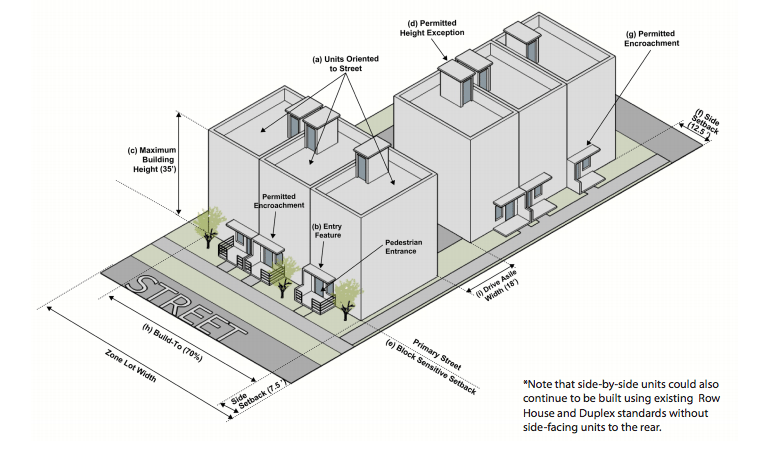
Ripple effects and counter arguments:
Some expect a surge of slot-home proposals in the next couple months. Duran, the real-estate guy, said that a developer paid cash and rushed the purchase in one recent deal on West 13th Avenue. "There’s a huge rush by developers right now to get plans approved before these changes take effect," he said.
However, city staff say they have not yet seen a significant increase in the number of applications from developers. They also contest the idea that this will be a loss for property owners. By improving aesthetics, they argue, the new rules could actually boost property values.
"Those involved with the slot home task force believe future designs will be much improved, and property values may ultimately increase wherever a building and those around it better reflect the desired neighborhood character," wrote planning department spokeswoman Andrea Burns in an email to Denverite.
Mumford thinks that the change could discourage construction of townhomes altogether, saying the number of new townhome units could drop significantly as a result. He believes that developers will shift some of their attention to condos.
For his part, Espinoza also acknowledged that developers might pursue fewer townhomes. That could have unintended consequences, such as encouraging denser styles of development -- but it also could prove profitable for land owners if they go for pricier projects instead, he said.
The city has not conducted a formal count of slot homes. However, city planner Analiese Hock estimated last month that more than 100 slot-home projects already exist around the city, with another 30 pending review.
What's next?
Under the current proposal, the city would basically change the rules in May 2018. If a developer submits formal plans before then, they can still move forward with their slot home.
Those formal plans can be costly to develop, which may mean that developers can't move fast enough to squeeze in extra slot homes before the deadline, according to Burns.
Some council members have pushed for a speedier timeline. However, the change still has to be approved by Denver City Council. Meanwhile, folks from the development side may push for a loosening of the requirements.
Mumford claimed that developers were all but ignored in the drafting of the rules. He thinks that different decisions would have allowed higher density while improving the aesthetics.
Which neighborhoods are affected?
Slot homes are built most often in the MU, MX and RH zoning districts in the urban areas near the city center. They tend to happen on "relatively narrow and deep lots." You can check your zoning here, or check out this map below.
